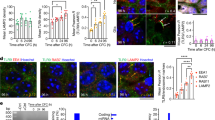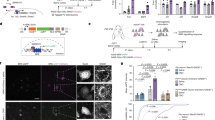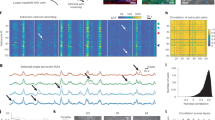Abstract
Emotionally important events are well remembered. Although memories of emotional experiences are known to be mediated and modulated by stress hormones such as glucocorticoids, little is known about the underlying molecular mechanisms. We found that the hippocampal glucocorticoid receptors that are critically engaged during the formation of long-term inhibitory avoidance memory in rats were coupled to the activation of CaMKIIα, TrkB, ERK, Akt, PLCγ and CREB, as well as a to a substantial induction of Arc and synaptic GluA1. Most of these changes, which are initiated by a nongenomic effect of glucocorticoid receptors, were also downstream of the activation of brain-derived neurotrophic factor (BDNF). Hippocampal administration of BDNF, but not of other neurotrophins, selectively rescued both the amnesia and the molecular impairments produced by glucocorticoid receptor inhibition. Thus, glucocorticoid receptors mediate long-term memory formation by recruiting the CaMKIIα-BDNF-CREB–dependent neural plasticity pathways.
This is a preview of subscription content, access via your institution
Access options
Subscribe to this journal
Receive 12 print issues and online access
$209.00 per year
only $17.42 per issue
Buy this article
- Purchase on Springer Link
- Instant access to full article PDF
Prices may be subject to local taxes which are calculated during checkout






Similar content being viewed by others
References
McGaugh, J.L. Memory and Emotion: The Making of Lasting Memory (Weidenfeld and Nicolson, 2003).
De Kloet, E.R. Hormones and the stressed brain. Ann. NY Acad. Sci. 1018, 1–15 (2004).
McEwen, B.S. Physiology and neurobiology of stress and adaptation: central role of the brain. Physiol. Rev. 87, 873–904 (2007).
Sapolsky, R.M. Glucocorticoids and hippocampal atrophy in neuropsychiatric disorders. Arch. Gen. Psychiatry 57, 925–935 (2000).
Roozendaal, B. 1999 Curt P. Richter award. Glucocorticoids and the regulation of memory consolidation. Psychoneuroendocrinology 25, 213–238 (2000).
Dudai, Y. Molecular bases of long-term memories: a question of persistence. Curr. Opin. Neurobiol. 12, 211–216 (2002).
Morimoto, M., Morita, N., Ozawa, H., Yokoyama, K. & Kawata, M. Distribution of glucocorticoid receptor immunoreactivity and mRNA in the rat brain: an immunohistochemical and in situ hybridization study. Neurosci. Res. 26, 235–269 (1996).
McEwen, B.S., Eiland, L., Hunter, R.G. & Miller, M.M. Stress and anxiety: structural plasticity and epigenetic regulation as a consequence of stress. Neuropharmacology 62, 3–12 (2012).
Revest, J.M. et al. The MAPK pathway and Egr-1 mediate stress-related behavioral effects of glucocorticoids. Nat. Neurosci. 8, 664–672 (2005).
Revest, J.M. et al. The enhancement of stress-related memory by glucocorticoids depends on synapsin-Ia/Ib. Mol. Psychiatry 15, 1140–1151 (2010).
Brogden, R.N., Goa, K.L. & Faulds, D. Mifepristone. A review of its pharmacodynamic and pharmacokinetic properties, and therapeutic potential. Drugs 45, 384–409 (1993).
Lisman, J., Schulman, H. & Cline, H. The molecular basis of CaMKII function in synaptic and behavioral memory. Nat. Rev. Neurosci. 3, 175–190 (2002).
Minichiello, L. TrkB signaling pathways in LTP and learning. Nat. Rev. Neurosci. 10, 850–860 (2009).
Sindreu, C.B., Scheiner, Z.S. & Storm, D.R. Ca2+-stimulated adenylyl cyclases regulate ERK-dependent activation of MSK1 during fear conditioning. Neuron 53, 79–89 (2007).
Hosaka, M., Hammer, R.E. & Sudhof, T.C. A phospho-switch controls the dynamic association of synapsins with synaptic vesicles. Neuron 24, 377–387 (1999).
Alberini, C.M. Transcription factors in long-term memory and synaptic plasticity. Physiol. Rev. 89, 121–145 (2009).
Bramham, C.R., Worley, P.F., Moore, M.J. & Guzowski, J.F. The immediate early gene arc/arg3.1: regulation, mechanisms, and function. J. Neurosci. 28, 11760–11767 (2008).
Taubenfeld, S.M., Wiig, K.A., Bear, M.F. & Alberini, C.M. A molecular correlate of memory and amnesia in the hippocampus. Nat. Neurosci. 2, 309–310 (1999).
Impey, S. et al. Stimulation of cAMP response element (CRE)-mediated transcription during contextual learning. Nat. Neurosci. 1, 595–601 (1998).
Arthur, J.S. et al. Mitogen- and stress-activated protein kinase 1 mediates cAMP response element–binding protein phosphorylation and activation by neurotrophins. J. Neurosci. 24, 4324–4332 (2004).
McGuinness, T.L. et al. Phosphorylation-dependent inhibition by synapsin I of organelle movement in squid axoplasm. J. Neurosci. 9, 4138–4149 (1989).
Pevzner, A., Miyashita, T., Schiffman, A.J. & Guzowski, J.F. Temporal dynamics of Arc gene induction in hippocampus: relationship to context memory formation. Neurobiol. Learn. Mem. 97, 313–320 (2012).
Fanselow, M.S., DeCola, J.P. & Young, S.L. Mechanisms responsible for reduced contextual conditioning with massed unsignaled unconditional stimuli. J. Exp. Psychol. Anim. Behav. Process. 19, 121–137 (1993).
Garcia-Osta, A. et al. MuSK expressed in the brain mediates cholinergic responses, synaptic plasticity and memory formation. J. Neurosci. 26, 7919–7932 (2006).
Chen, D.Y. et al. A critical role for IGF-II in memory consolidation and enhancement. Nature 469, 491–497 (2011).
Lee, J.L., Everitt, B.J. & Thomas, K.L. Independent cellular processes for hippocampal memory consolidation and reconsolidation. Science 304, 839–843 (2004).
Bekinschtein, P., Cammarota, M., Izquierdo, I. & Medina, J.H. BDNF and memory formation and storage. Neuroscientist 14, 147–156 (2008).
Cahill, L., Prins, B., Weber, M. & McGaugh, J.L. Beta-adrenergic activation and memory for emotional events. Nature 371, 702–704 (1994).
Hu, H. et al. Emotion enhances learning via norepinephrine regulation of AMPA-receptor trafficking. Cell 131, 160–173 (2007).
Duncan, G.E. et al. Beta-adrenergic receptor distribution in human and rat hippocampal formation: marked species differences. Brain Res. 561, 84–92 (1991).
Black, J.W., Crowther, A.F., Shanks, R.G., Smith, L.H. & Dornhorst, A.C. A new adrenergic betareceptor antagonist. Lancet 1, 1080–1081 (1964).
Chameau, P., Qin, Y., Spijker, S., Smit, G. & Joels, M. Glucocorticoids specifically enhance L-type calcium current amplitude and affect calcium channel subunit expression in the mouse hippocampus. J. Neurophysiol. 97, 5–14 (2007).
Takahashi, T. et al. Corticosterone acutely prolonged N-methyl-D-aspartate receptor–mediated Ca2+ elevation in cultured rat hippocampal neurons. J. Neurochem. 83, 1441–1451 (2002).
McReynolds, J.R. et al. Memory-enhancing corticosterone treatment increases amygdala norepinephrine and Arc protein expression in hippocampal synaptic fractions. Neurobiol. Learn. Mem. 93, 312–321 (2010).
Molteni, R. et al. Depression-prone mice with reduced glucocorticoid receptor expression display an altered stress-dependent regulation of brain-derived neurotrophic factor and activity-regulated cytoskeleton-associated protein. J. Psychopharmacol. 24, 595–603 (2010).
Liu, W., Yuen, E.Y. & Yan, Z. The stress hormone corticosterone increases synaptic alpha-amino-3-hydroxy-5-methyl-4-isoxazolepropionic acid (AMPA) receptors via serum- and glucocorticoid-inducible kinase (SGK) regulation of the GDI-Rab4 complex. J. Biol. Chem. 285, 6101–6108 (2010).
Vazdarjanova, A. et al. Spatial exploration induces ARC, a plasticity-related immediate-early gene, only in calcium/calmodulin-dependent protein kinase II–positive principal excitatory and inhibitory neurons of the rat forebrain. J. Comp. Neurol. 498, 317–329 (2006).
Jeanneteau, F., Garabedian, M.J. & Chao, M.V. Activation of Trk neurotrophin receptors by glucocorticoids provides a neuroprotective effect. Proc. Natl. Acad. Sci. USA 105, 4862–4867 (2008).
Groeneweg, F.L., Karst, H., de Kloet, E.R. & Joels, M. Rapid non-genomic effects of corticosteroids and their role in the central stress response. J. Endocrinol. 209, 153–167 (2011).
Numakawa, T. et al. Glucocorticoid receptor interaction with TrkB promotes BDNF-triggered PLC-gamma signaling for glutamate release via a glutamate transporter. Proc. Natl. Acad. Sci. USA 106, 647–652 (2009).
Lu, B. BDNF and activity-dependent synaptic modulation. Learn. Mem. 10, 86–98 (2003).
Meyer-Franke, A. et al. Depolarization and cAMP elevation rapidly recruit TrkB to the plasma membrane of CNS neurons. Neuron 21, 681–693 (1998).
Ji, Y., Pang, P.T., Feng, L. & Lu, B. Cyclic AMP controls BDNF-induced TrkB phosphorylation and dendritic spine formation in mature hippocampal neurons. Nat. Neurosci. 8, 164–172 (2005).
Alonso, M. et al. BDNF-triggered events in the rat hippocampus are required for both short- and long-term memory formation. Hippocampus 12, 551–560 (2002).
Allaman, I., Pellerin, L. & Magistretti, P.J. Glucocorticoids modulate neurotransmitter-induced glycogen metabolism in cultured cortical astrocytes. J. Neurochem. 88, 900–908 (2004).
Sandi, C. Glucocorticoids act on glutamatergic pathways to affect memory processes. Trends Neurosci. 34, 165–176 (2011).
Bekinschtein, P. et al. Persistence of long-term memory storage requires a late protein synthesis– and BDNF- dependent phase in the hippocampus. Neuron 53, 261–277 (2007).
Roozendaal, B. & McGaugh, J.L. Basolateral amygdala lesions block the memory-enhancing effect of glucocorticoid administration in the dorsal hippocampus of rats. Eur. J. Neurosci. 9, 76–83 (1997).
Ou, L.C., Yeh, S.H. & Gean, P.W. Late expression of brain-derived neurotrophic factor in the amygdala is required for persistence of fear memory. Neurobiol. Learn. Mem. 93, 372–382 (2010).
Ji, J.Z., Wang, X.M. & Li, B.M. Deficit in long-term contextual fear memory induced by blockade of beta-adrenoceptors in hippocampal CA1 region. Eur. J. Neurosci. 17, 1947–1952 (2003).
Acknowledgements
We thank S. Stern, S. Sheng, S. Taubenfeld and S. Katz for technical assistance, A. Suzuki and X. Ye for comments on the manuscript, and R. Testi for valuable discussions. This work was supported by grants from the US National Institutes of Health (RO1-MH065635), National Alliance for Research on Schizophrenia and Depression (NARSAD) and the Philoctetes Foundation to C.M.A. and US National Institutes of Health grant F31-MH816213 to D.Y.C.
Author information
Authors and Affiliations
Contributions
C.M.A., D.Y.C. and D.B.-M. designed and developed the study. D.Y.C. carried out the behavioral studies. D.Y.C., D.B.-M. and G.P. carried out the biochemical studies and analyses. C.M.A., D.Y.C. and D.B.-M. wrote the manuscript.
Corresponding author
Ethics declarations
Competing interests
The authors declare no competing financial interests.
Supplementary information
Supplementary Text and Figures
Supplementary Figures 1–17 and Supplementary Tables 1–6 (PDF 42827 kb)
Rights and permissions
About this article
Cite this article
Chen, D., Bambah-Mukku, D., Pollonini, G. et al. Glucocorticoid receptors recruit the CaMKIIα-BDNF-CREB pathways to mediate memory consolidation. Nat Neurosci 15, 1707–1714 (2012). https://doi.org/10.1038/nn.3266
Received:
Accepted:
Published:
Issue Date:
DOI: https://doi.org/10.1038/nn.3266
This article is cited by
-
Humulus lupulus L. extract and its active constituent xanthohumol attenuate oxidative stress and nerve injury induced by iron overload via activating AKT/GSK3β and Nrf2/NQO1 pathways
Journal of Natural Medicines (2023)
-
Hippocampal Iron Accumulation Impairs Synapses and Memory via Suppressing Furin Expression and Downregulating BDNF Maturation
Molecular Neurobiology (2022)
-
Central administration of afzelin extracted from Ribes fasciculatum improves cognitive and memory function in a mouse model of dementia
Scientific Reports (2021)
-
Memory regulation in feeding habit transformation to dead prey fish of Chinese perch (Siniperca chuatsi)
Fish Physiology and Biochemistry (2021)
-
Modeling suggests combined-drug treatments for disorders impairing synaptic plasticity via shared signaling pathways
Journal of Computational Neuroscience (2021)



